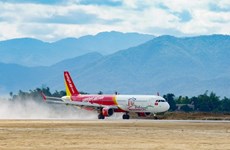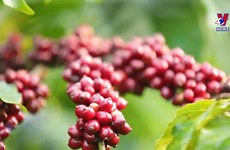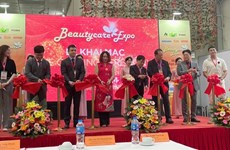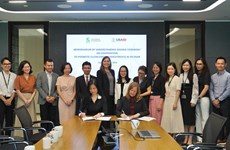Mekong Delta helped to maximise farming techniques
A project, funded by the International Rice Research Institute (IRRI)
and the World Bank (WB), is looking to aid Mekong delta provinces to
keep up with advanced farming techniques in the world to enhance the
competitiveness of their rice.
A project, funded by the International Rice Research Institute (IRRI)
and the World Bank (WB), is looking to aid Mekong delta provinces to
keep up with advanced farming techniques in the world to enhance the
competitiveness of their rice.
The project, Closing Rice Yield Gaps in Asia (CORIGAP), designed for the 2013-2018 period, aims to improve rice productivity, quality and efficiency while reducing the gaps in rice yield in the region.
Furthermore, by developing modern rice farming models, it also targets to contribute to reducing poverty, ensuring food security and improving income for local people.
Activities of the project for 2014 were discussed in Can Tho city on February 18, with the participation of local scientists and their colleagues from Thailand, Indonesia, Sri Lanka and Myanmar.
The Mekong Delta has targeted an annual rice output of 24 million tonnes from 2020 to 2030 to remain as the country’s top rice producer.
To reach the goal, the region is required to zone 4.3 million hectares of land for rice farming from now to 2030.
Localities are also working with research institutes to apply new biotechnology allowing the creation of new rice varieties and improving existing ones.
From now to 2015, Mekong Delta provinces plan to increase the mechanisation of farm work to minimise post-harvest and storage losses.
From 2015 onwards, the localities will multiply cultivation under the Good Agricultural Practices so that the area under clean rice will account for at least 40 percent of rice land.
According to the Mekong Delta Rice Research Institute, the region increased its rice output from 4.2 million tonnes in 1976 to 24.5 million tonnes in 2012.-VNA
The project, Closing Rice Yield Gaps in Asia (CORIGAP), designed for the 2013-2018 period, aims to improve rice productivity, quality and efficiency while reducing the gaps in rice yield in the region.
Furthermore, by developing modern rice farming models, it also targets to contribute to reducing poverty, ensuring food security and improving income for local people.
Activities of the project for 2014 were discussed in Can Tho city on February 18, with the participation of local scientists and their colleagues from Thailand, Indonesia, Sri Lanka and Myanmar.
The Mekong Delta has targeted an annual rice output of 24 million tonnes from 2020 to 2030 to remain as the country’s top rice producer.
To reach the goal, the region is required to zone 4.3 million hectares of land for rice farming from now to 2030.
Localities are also working with research institutes to apply new biotechnology allowing the creation of new rice varieties and improving existing ones.
From now to 2015, Mekong Delta provinces plan to increase the mechanisation of farm work to minimise post-harvest and storage losses.
From 2015 onwards, the localities will multiply cultivation under the Good Agricultural Practices so that the area under clean rice will account for at least 40 percent of rice land.
According to the Mekong Delta Rice Research Institute, the region increased its rice output from 4.2 million tonnes in 1976 to 24.5 million tonnes in 2012.-VNA













